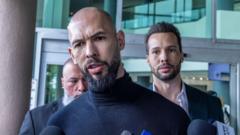Is Everyone Really Welcome at Glastonbury After the Kneecap Backlash?

The Unfolding Story of Glastonbury and Political Commentary in Music
In a world where music and politics often intersect, the recent comments surrounding the Glastonbury Festival and the band Kneecap have sparked significant discussion. With both artists and politicians weighing in, this article explores how music serves as a platform for activism, the responses from key figures, and the broader implications for freedom of expression in the arts. As we delve into this multifaceted narrative, we will uncover the importance of artistic expression, public discourse, and the role of festivals in fostering community and dialogue.
Glastonbury: A Platform for Expression
The Glastonbury Festival, renowned for its eclectic line-up and vibrant atmosphere, has long been a space for artistic freedom and social commentary. The festival's co-organizer, Emily Eavis, recently highlighted that their main focus is on creating the best experience for attendees. “We’re incredibly lucky that so many people want to come to Glastonbury,” she remarked, emphasizing the festival's appeal and its ability to bring people together.
However, the festival is also a backdrop for heated political discussions, as evidenced by recent statements from various artists. Eavis acknowledged the significance of political commentary at festivals, stating, “We remain a platform for many, many artists from all over the world, and everyone is welcome here.” This welcoming atmosphere is crucial, especially in times of political unrest or social upheaval.
The Impact of Political Commentary
Music has always had the power to influence public opinion and raise awareness about pressing issues. The comments made by Eavis reflect a growing trend among artists and festival organizers to embrace political dialogue. In recent years, many musicians have used their platforms to address social justice, climate change, and human rights issues, making festivals like Glastonbury not just a celebration of music but also a space for activism.
Kneecap and the Political Landscape
Kneecap, a band known for their outspoken views and unique blend of rap and punk, has recently found themselves at the center of controversy due to their comments on Palestine. The group's response to the Prime Minister’s remarks highlights how music can challenge the status quo. Sharing their thoughts on social media, Kneecap stated, “You know what’s ‘not appropriate’? Arming a f***ing genocide… solidarity with [Palestinian Action].” This bold statement has resonated with many, showcasing how music can be a vehicle for political expression.
The Repercussions of Artistic Expression
As Kneecap continues to advocate for the Palestinian cause, they face backlash from various political figures, which raises questions about censorship and freedom of speech. Acclaimed novelist Irvine Welsh has publicly supported the band, calling the government's opposition to their message a "total embarrassment." Welsh’s critique emphasizes the importance of artistic expression as a means to challenge oppressive narratives.
The Support for Kneecap
Kneecap is not alone in their struggle; numerous artists and public figures have rallied behind them. A joint statement by well-known musicians, including Paul Weller and Massive Attack, condemns the attempts to censor the band. The statement articulates a clear concern about the “concerted attempt to censor and ultimately deplatform” Kneecap, highlighting the ongoing battle artists face when expressing controversial opinions.
The Role of Solidarity in the Arts
This solidarity among artists underscores the collective responsibility to protect freedom of expression in the music industry. The ability to voice dissenting opinions is essential, particularly in a cultural landscape that can sometimes feel stifled by political correctness or censorship. By standing together, these artists create a powerful movement that champions the right to speak out and make a difference through their art.
Freedom of Expression: A Double-Edged Sword
The ongoing tensions between musicians and political figures illustrate the complexities of freedom of expression. While artists often celebrate their ability to voice their opinions, they also face significant consequences for their statements. This reality raises important questions about the balance between artistic freedom and political pressure. As artists navigate this delicate terrain, they must weigh the potential backlash against their desire to speak truth to power.
The Importance of Safe Spaces
Festivals like Glastonbury provide a unique environment where artists can express themselves without fear of censorship. These events create safe spaces for dialogue and community, allowing attendees to engage with important social issues while enjoying music. The festival atmosphere encourages open discussions, making it an ideal platform for artists to share their perspectives on political matters.
The Future of Music and Activism
As we move forward, the relationship between music and activism will likely continue to evolve. The events surrounding Glastonbury and Kneecap serve as a reminder of the crucial role of artists in shaping public discourse. With the rise of social media, musicians now have unprecedented opportunities to connect with fans and advocate for change. This digital landscape allows for the rapid dissemination of ideas and fosters a global community that values artistic expression.
Engagement Through Music
Music has the unparalleled ability to unify people across diverse backgrounds. By addressing social and political issues through their art, musicians can inspire listeners to take action and engage with the world around them. The engagement goes both ways; audiences are increasingly seeking out artists who align with their values and beliefs, creating a feedback loop that further amplifies messages of activism.
Conclusion: The Power of Music as Activism
The ongoing dialogue surrounding Glastonbury and the response to Kneecap’s political advocacy highlights the significant role of music in shaping societal narratives. Artists like Eavis and Welsh demonstrate the importance of providing a platform for diverse voices, particularly in times of political unrest. As we continue to navigate these complex issues, it is essential to recognize the power of music as a tool for change and the responsibility that comes with it.
As listeners and supporters of the arts, we must remain vigilant in promoting freedom of expression and standing in solidarity with artists who dare to speak out. The fight for artistic integrity and the right to voice dissenting opinions is ongoing, and it is crucial that we support those who are brave enough to take a stand.
FAQs
What is the significance of Glastonbury in the music industry?
Glastonbury Festival is not just a music event; it's a cultural phenomenon that promotes artistic expression and social activism. It serves as a platform for artists to voice their opinions and engage with pressing social issues.
How has Kneecap addressed political issues in their music?
Kneecap has been vocal about various political issues, particularly their support for Palestine. Their lyrics and public statements often challenge political narratives and advocate for social justice.
Why is artistic expression important in the context of political discourse?
Artistic expression allows individuals and communities to voice their opinions on social and political matters. It fosters dialogue, raises awareness, and can inspire collective action, making it a powerful tool for change.
As we reflect on these developments, one must ask: how can we further support artistic expression in the face of political challenges? #MusicAndActivism #FreedomOfExpression #SupportArtists
Published: 2025-06-25 10:32:42 | Category: Entertainment



